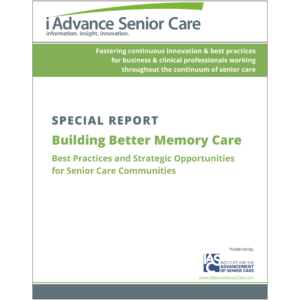Those with dementia benefit from peer support groups
Peer support groups positively affect people in the early stages of dementia, increasing their well-being, social support and practical coping strategies, according to results of a project by two organizations in the United Kingdom.
The Dementia Self-Help project, by the Mental Health Foundation and Housing and Care 21, an affordable seniors housing provider, found that peer support groups helped members improve their ability to communicate as well as manage their memory and their lives. The benefits of group participation extended beyond those with dementia to include staff members, families, friends, other residents and the housing provider.
The researchers facilitated peer support groups for those receiving extra care where they live. Group participants were interviewed at 6 months and at 9 months. Recommendations for housing providers and others stemming from the project:
- Support peer groups because of their proven social and financial value.
- Embed peer support groups in living arrangements with the assistance of local services.
- Shift the work culture so that the primary focus is on maintaining residents’ social connectedness, not only their independence.
- Encourage family members to become involved with peer support; seeing loved ones engaging with the community improves the quality of life for both residents and their families.
The organizations have published a free guide for those wishing to set up peer support groups in their communities.
I Advance Senior Care is the industry-leading source for practical, in-depth, business-building, and resident care information for owners, executives, administrators, and directors of nursing at assisted living communities, skilled nursing facilities, post-acute facilities, and continuing care retirement communities. The I Advance Senior Care editorial team and industry experts provide market analysis, strategic direction, policy commentary, clinical best-practices, business management, and technology breakthroughs.
I Advance Senior Care is part of the Institute for the Advancement of Senior Care and published by Plain-English Health Care.
Related Articles
Topics: Alzheimer's/Dementia











